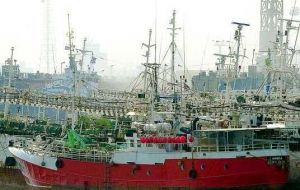MercoPress. South Atlantic News Agency
Frozen fish narcotics export ring busted in Montevideo port

Uruguay's fishing industry has come under the spotlight of the Montevideo and Spanish police narcotics departments following the arrest of a Spanish citizen and the discovery of containers to be exported with 300 kilos of cocaine hidden among the frozen fish.
The Spanish citizen had a company which was operating from Montevideo with two vessels, "Cibeles" and "Banzare" with Uruguayan licences, including for toothfish and on request from the famous Spanish Magistrate Baltasar Garzón was arrested allegedly linked to the attempted introduction of 2.2 tons of cocaine to Spain. The second operation involved a search of containers with fish ready to be shipped to Europe and which working on tips, allowed the discovery of 300 kilos of cocaine. Containers with frozen fish are ideal for smuggling since dogs can't sniff the narcotics and there are fears that if left open for too long it could spoil the cargo, according to Uruguayan members of the police involved in the search. As a consequence of these discoveries Narcotics and other Uruguayan government offices anticipated they will monitor closely all fish shipments and exports, besides looking back into records to see if similar operations can be detected. Uruguayan judicial and police sources do not discard that other Spanish companies could be linked to narcotics' smuggling. Ricardo Gil Iribarne head of Uruguay's Anti laundering assets office said that "without generating alarm, we must agree that transport by sea is an area of most concern". The head of Uruguay's anti Drugs Office Jorge Vázquez, (who also happens to be the president's brother) anticipated that "we're not going to check every export sector, but only those where there are more opportunities and the fishing industry is one of them". The Spanish businessman operating from Montevideo is also of great concern for Uruguay's Fisheries authorities since his company's two Uruguayan flagged vessels have expired fishing licences and one of them, "Banzares" is on its third trip to Durban, South Africa for transhipment. The second vessel "Cibeles" has been seized in Montevideo. The inquiry also revealed that the "Benzare" toothfish license had expired which didn't impede the Uruguayan Fisheries from having sent an observer on board during its last two incursions and an inspector to check the unloading of the catches. The second raid, Operation Cerberus, was also coordinated together with information from Spanish authorities and helped discover 300 kilos of pure cocaine neatly stored among the frozen fish which was to the dispatched to Vigo. "We had detected cases of cocaine shipped in containers with frozen beef but this is the first time with fish", and it's hard to know for how long the operation has been going. Shipping narcotics in fish containers apparently is a very efficient system not only because dogs can't sniff them but also because since it's a highly perishable cargo inspection is usually not as meticulous and time consuming as with other merchandise. Sources from Uruguay's Narcotics brigade added that vessels transporting fish containers usually call in several ports before reaching destination and it's not unusual to tranship in the high seas "which makes it difficult to control the cargo and they can also dump the stuff over board if detected". The 2.2 tons of cocaine were hauled when entering Spanish waters a few months ago. Apparently the cargo had been transhipped in the high seas.




Top Comments
Disclaimer & comment rulesCommenting for this story is now closed.
If you have a Facebook account, become a fan and comment on our Facebook Page!